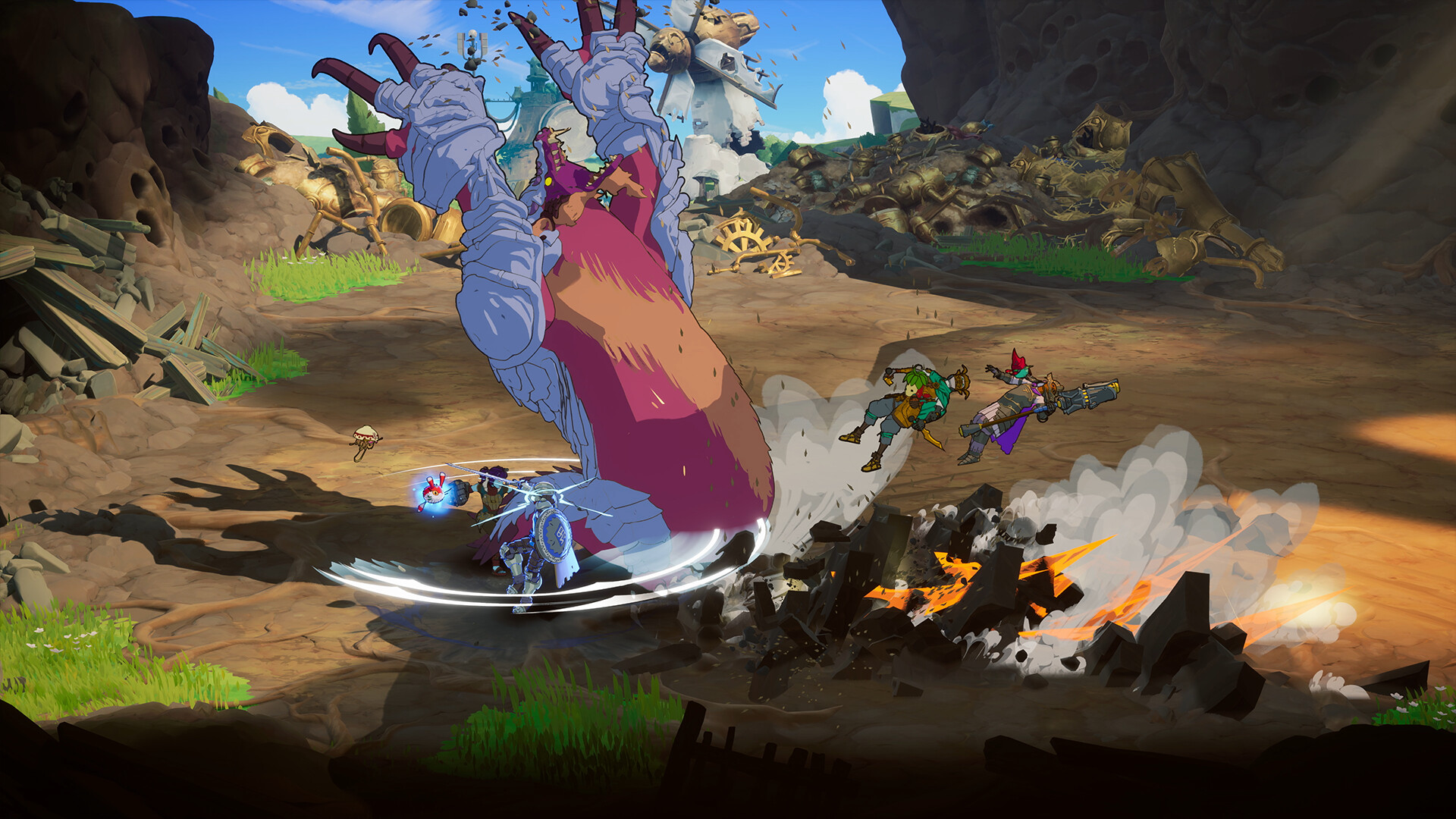Risk Review: A little global domination for your Windows Phone
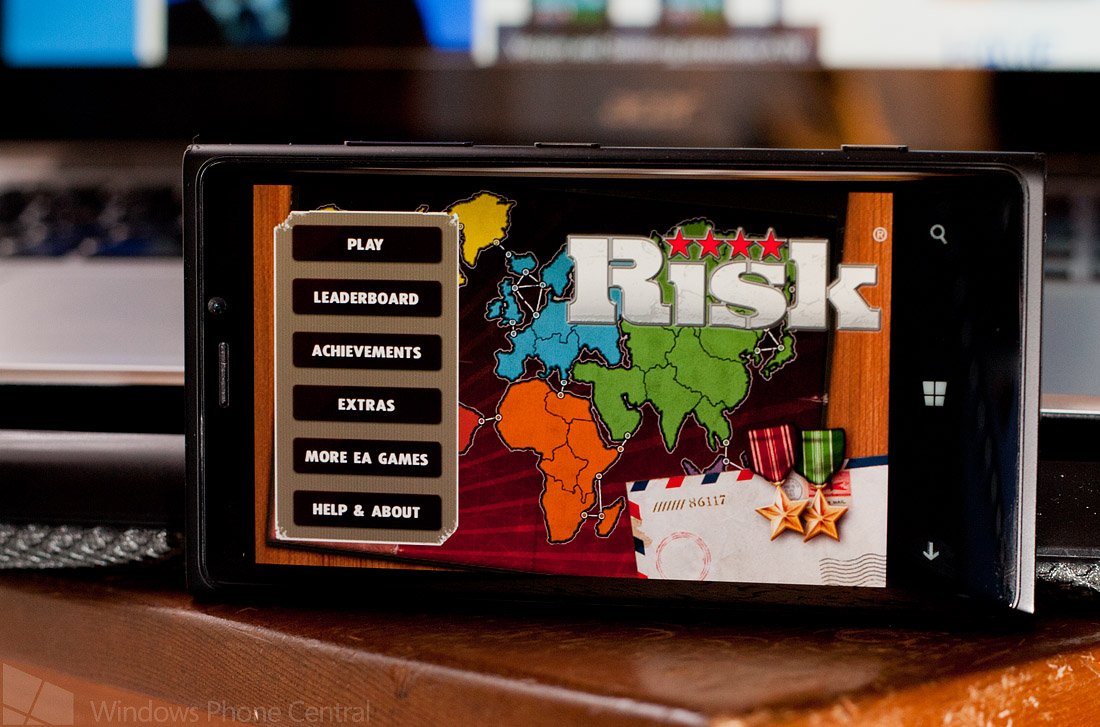
We’re hard at work on our Skulls of the Shogun review, but it’s a long game and also features an extensive multiplayer component. As such, we’ll hold our judgment of that title until next week. In the meantime, let’s look at one of those formerly Nokia exclusive Xbox games that half of us loved to love while the other half loved to grumble about: Risk.
The Nokia-Electronic Arts partnership has produced games in a variety of genres so far. The mostly highly represented game type is actually board games, with The Game of Life, Connect 4, Trivial Pursuit, and Risk among its numbers. Risk recently gained Windows Phone 8 compatibility, making it a prime target for review. It’s also one of the stronger board game adaptations to appear on Microsoft’s mobile platform.
Conquest of the world
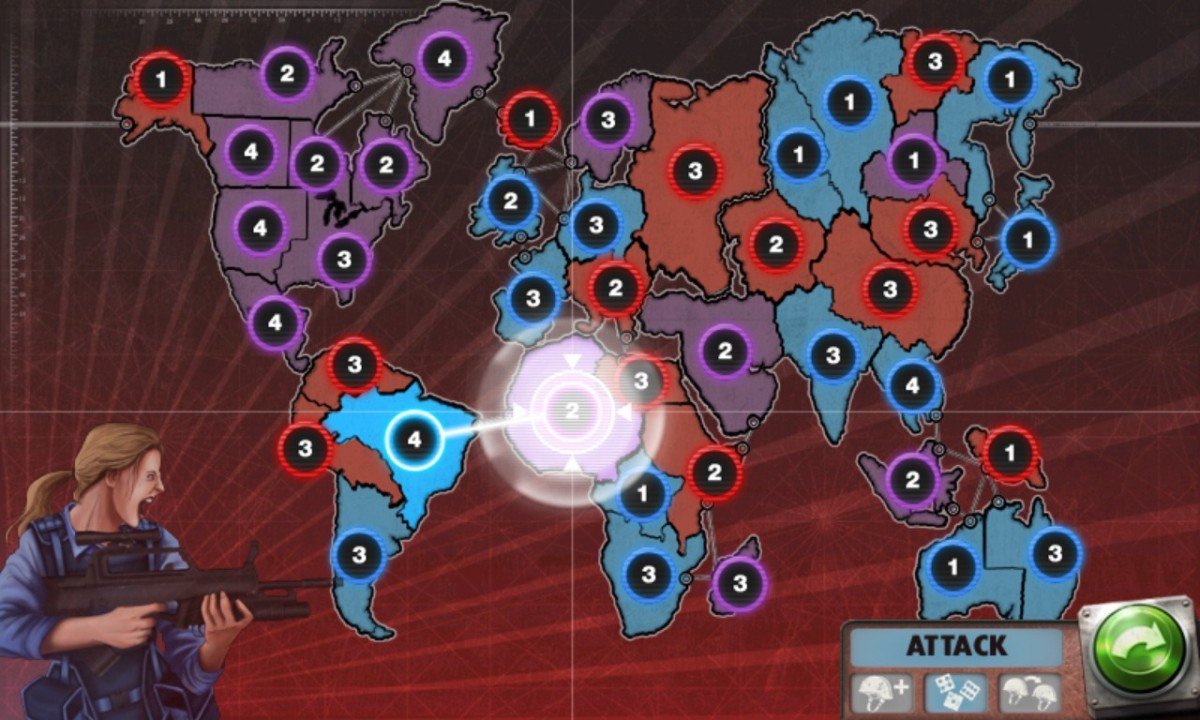
Risk is a strategy game for 2-6 players. The board contains a map of the world with each continent divided into multiple territories. The goal is to eliminate all other players and take ownership of the entire world, presumably forcing its inhabitants to listen to nothing but the winner’s favorite music for the rest of eternity.
At the start of a game, each player receives a certain number of territories. By default, the game randomly assigns territories. The number of units placed on each territory is also random. However, you can choose to manually distribute territories for a slower, more analog experience.
Years ago, I found the real board game a bit tough to learn because of all the dice rolling and my opponents already knowing basic strategies ahead of me. Luckily, the game starts out with a helpful tutorial that makes learning a cinch. Besides, this version is set up in a largely intuitive fashion, with just the right amount of automation to get new players going and keep the overall game moving at a brisk pace.
Game phases
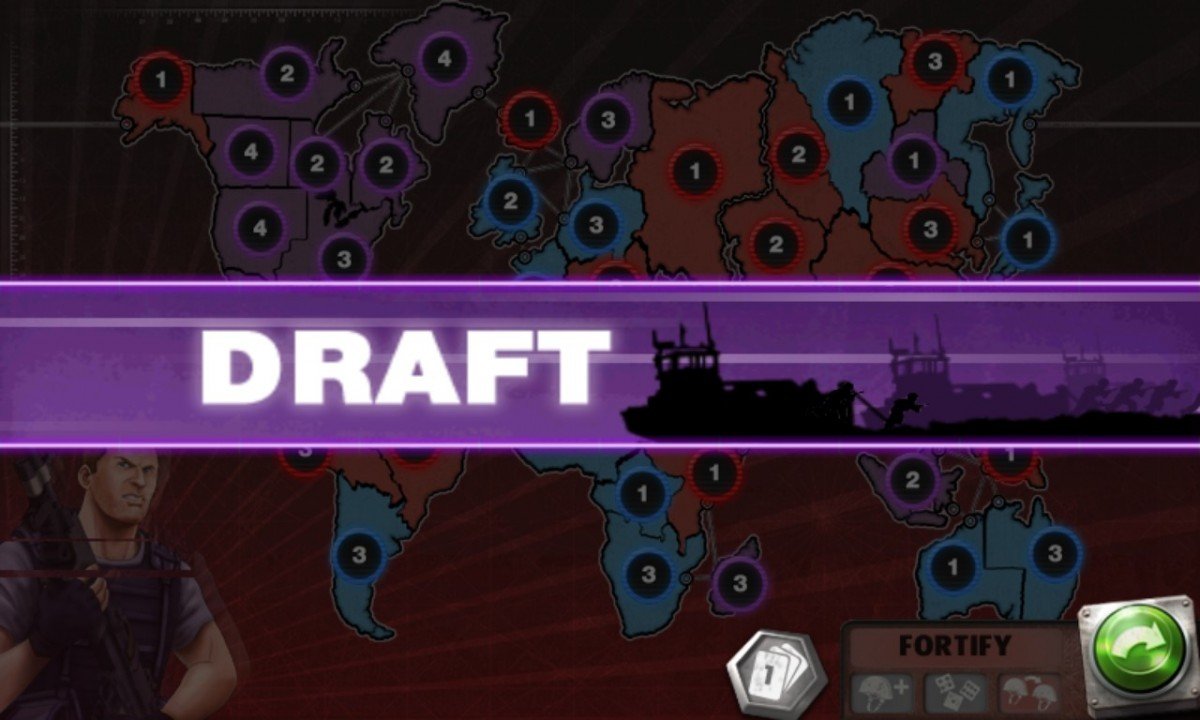
Every turn consists of three phases. Wrap your head around those and you’re ready to take on the world, so to speak.
- Deployment: At the beginning of each turn, you’re awarded a number of units based on how many continents you have completely under your control. These units can be distributed among your territories at will. Generally, you’ll want to put them in places that you’ll be launching attacks from or expect to receive attacks.
- Attack: Risk’s battles are one part a game of numbers and the other part luck. You’ll select a territory with which to attack and an adjacent recipient of the attack. Each side gets to roll a certain number of dice depending on how many units it has involved in the clash. The highest roll wins, while the defender wins in the case of a draw. You can choose to manually watch each dice roll or instantly view the battle results – a much appreciated touch compared to being forced to watch each spin in The Game of Life. A player can launch as many attacks as he or she pleases in a turn before moving on to the final phase.
- Fortification: After your attacks wrap up, you can reposition units from one single territory to another single territory. That’s the only gameplay element I’m not crazy about; I’d rather be able to move units to or from multiple territories. But I guess it has the benefit of preventing players from building impregnable defenses.
All in the cards
Risk also has a collectible card system to keep things interesting. At the end of a turn, players are awarded one card if they have successfully conquered another player’s territory. Once a player collects three of the same card or one of each card type, he or she is then prompted to trade in those cards for additional units. Those units can make a huge difference in attack or defense, so you’ll generally want to cash cards in when you get the chance.
Get the Windows Central Newsletter
All the latest news, reviews, and guides for Windows and Xbox diehards.
Single player
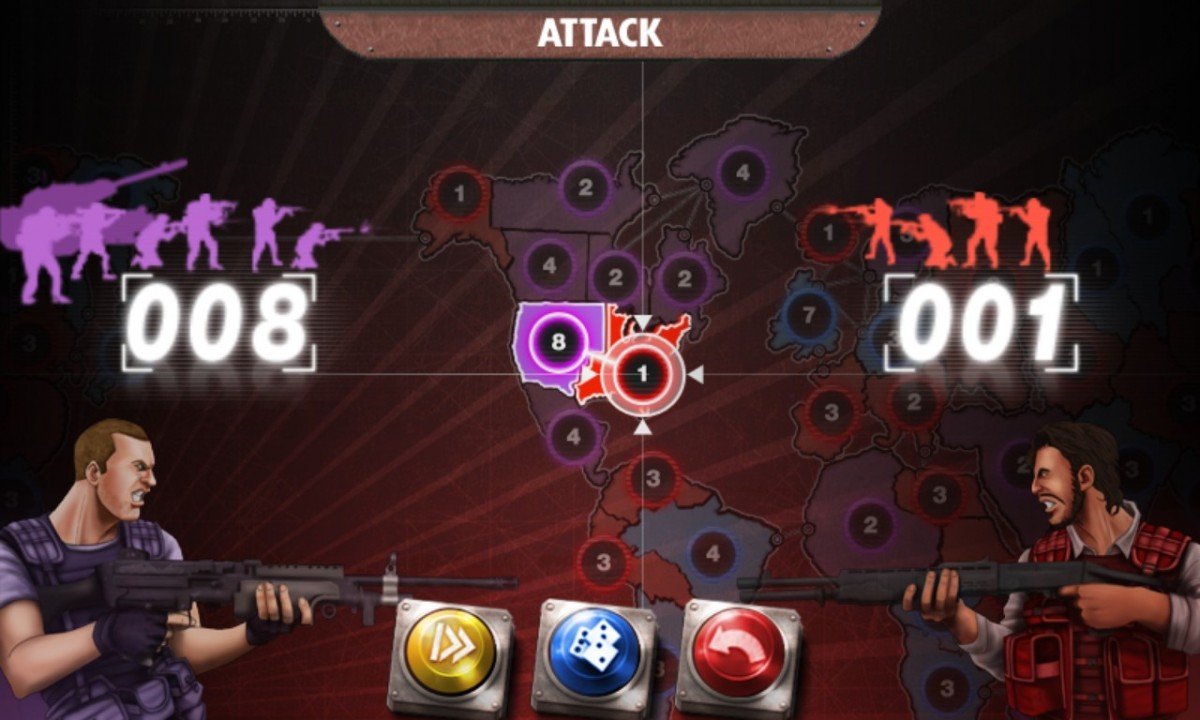
Board games are meant to be played with friends, so videogame ports often drop the ball with their single-player components. This version of Risk doesn’t introduce a metagame or any fancy new modes to spice up the one-player game. But it does at least offer three difficulty settings and the choice of how many AI players to compete against.
Whereas playing The Game of Life by one’s self is about as exciting as watching paint dry, Risk fares much better. The player has a lot of choice in how to approach the game, both from offensive and defensive standpoints. Do you focus on taking the smaller continents first, or take on the larger continents in order to gain a much higher number of troops on your next turn? And who is the greatest threat to defend against?
Even the battles, while relying on the random factor of dice rolls, can basically be won by numbers, so they don’t feel too arbitrary. On the whole, playing a game or two by yourself now and then is surprisingly fun.
Multiplayer
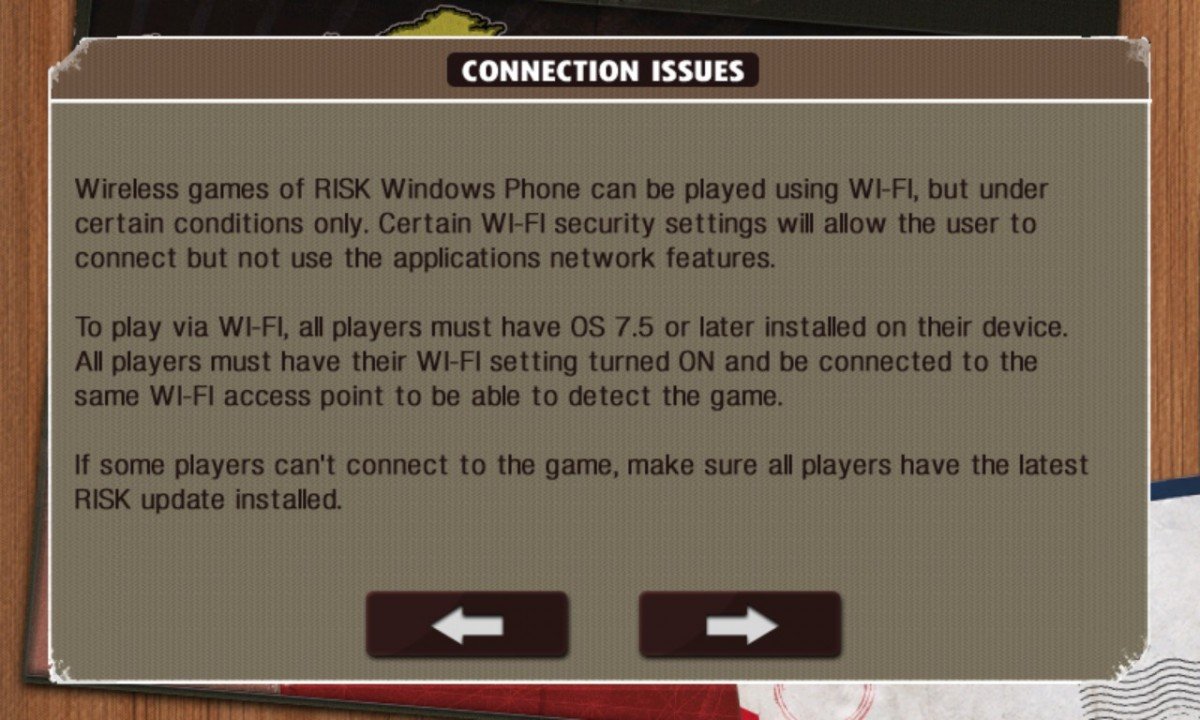
Like every other Nokia exclusive port to date, Risk lacks online play... But so does this iOS version upon which it’s based, so we can’t complain too loudly. This one does at least outdo The Game of Life by offering two different multiplayer options: Pass and Play or Local Wi-Fi.
Risk is one of the few mainstream board games that I can actually see being fun enough to play with others in a local setting on a phone. Plus the automation of territory distribution and dice rolls really speeds up what can otherwise be a very time-consuming game.
Achievements
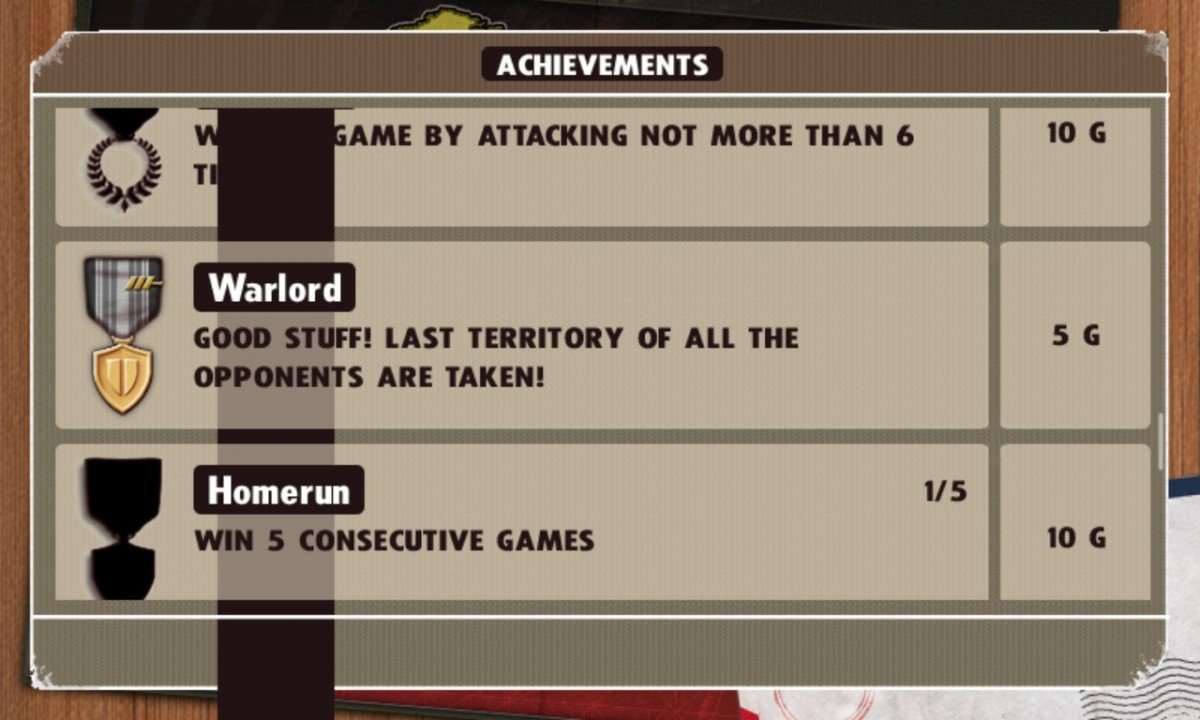
This game’s Achievements are quite reasonable on the whole – far more so than the other Xbox strategy board game, Carcassonne. Most of them come down to winning a certain number of games or receiving different numbers of kudos for attacking and defending in various ways.
The hardest Achievement is ‘Allrounder.’ You’ll have to win a game against the AI on all three difficulty levels: Easy, Normal, and Hard. As you can imagine, the latter difficulty will present something of a challenge. Still, use some careful thinking, practice, and/or a little cheating and you’re sure to prevail.
Note: On Windows Phone 8, the in-game Achievements menu has a bug in which a black vertical bar flickers on the screen as pictured above. It’s a minor bug and doesn’t hurt anything.
Overall Impression
Risk’s closest Windows Phone competitor is fellow strategic board game adaptation Carcassonne. That game has a bit more going on under its hood and boasts the online multiplayer that Risk lacks. Still, Carcassonne’s actual online implementation is terrible and the Achievements require an insane amount of grinding compared to this one.
Risk also carries the benefit of being easier to learn and generally better known, so it works much better in a local setting. I’m not crazy about pass-and-play multiplayer, thus the addition of local Wi-Fi support is most welcome. Risk stands above most other Windows Phone board games thanks to its relatively deep gameplay and sharp interface. If you like this style of game, consider this one a very low risk purchase.
Risk costs $2.99 and runs on both Windows Phone 7 and 8. You can find its Windows Phone Store page here.

Paul Acevedo is the Games Editor at Windows Central. A lifelong gamer, he has written about videogames for over 15 years and reviewed over 350 games for our site. Follow him on Twitter @PaulRAcevedo. Don’t hate. Appreciate!

